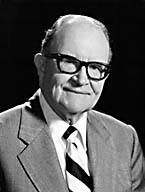A Quote by Sharon Salzberg
We can't give the truth to someone as an object, we can only point to it, inviting inspection. It is in that spirit that we can hear or read a teaching and then look at our own lives, at our own experiences to see whether anything might have been revealed about them.
Related Quotes
It requires something more than personal experience to gain a philosophy or point of view from any specific event. It is the quality of our response to the event and our capacity to enter into the lives of others that help us to make their lives and experiences our own. In my own case my convictions have derived and developed from events in the lives of others as well as from my own experience. What I have seen meted out to others by authority and repression, economic and political, transcends anything I myself may have endured.
It is only when we want to take our lives out of the Father’s hands and have them under our own control that we find ourselves gripped with anxiety. The secret of freedom from anxiety is freedom from ourselves and abandonment of our own plans. But that spirit emerges in our lives only when our minds are filled with the knowledge that our Father can be trusted implicitly to supply everything we need.
By our attitude, we decide to read, or not to read. By our attitude, we decide to try or give up. By our attitude, we blame ourselves for our failure, or we blame others. Our attitude determines whether we tell the truth or lie, act or procrastinate, advance or recede, and by our own attitude we and we alone actually decide whether to succeed or fail.
What Grandfather Burton did for me was to write a sacred family record, the small plates of Burton, or, if you will, an inspirational family record. Much of what we now regard as scripture was not anything more or less than men writing of their own spiritual experiences for the benefit of their posterity. These scriptures are family records. Therefore, as a people we ought to write of our own lives and our own experiences to form a sacred record for our descendants. We must provide for them the same uplifting, faith-promoting strength that the ancient scriptures now give us.
However good we are, however correctly we seek to lead our lives, tragedies do occur. We can blame others, look for justification, imagine how our lives would have been different without them. But none of that matters: they have happened, and that is that. From this point on, it is necessary that we review our own lives, overcome fear, and begin the process of reconstruction.
I think that most of us, anyway, read these stories that we know are not "true" because we're hungry for another kind of truth: the mythic truth about human nature in general, the particular truth about those life-communities that define our own identity, and the most specific truth of all: our own self-story. Fiction, because it is not about someone who lived in the real world, always has the possibility of being about oneself. --From the Introduction
When we look at a painting, or hear a symphony, or read a book, and feel more Named, then, for us, that work is a work of Christian art. But to look at a work of art and then to make a judgment as to whether or not it is art, and whether or not it is Christian, is presumptuous. It is something we cannot know in any conclusive way. We can know only if it speaks within our own hearts, and leads us to living more deeply with Christ in God.
Pleasure cannot be shared; like Pain, it can only be experienced or inflicted, and when we give Pleasure to our Lovers or bestow Charity upon the Needy, we do so, not to gratify the object of our Benevolence, but only ourselves. For the Truth is that we are kind for the same reason as we are cruel, in order that we may enhance the sense of our own Power.
If love could force my own thoughts over the edge of the world and out of time, then could I not see how even divine omnipotence might by the force of its own love be swayed down to the world? ...how it might, because it could know its own creatures only by compassion, put on mortal flesh, become a man, and walk among us, assume our nature and our fate, suffer our faults and our death?
All the great masters in the world have been saying only one thing down the centuries, "Have your own mind and have your own individuality. Don't be a part of the crowd; don't be a wheel in the whole mechanism of a vast society. Be individual, on your own. Live life with your own eyes; listen to music with your own ears." But we are not doing anything with our own ears, with our own eyes, with our own minds; everything is being taught, and we are following it.
Everyday we slaughter our finest impulses. That is why we get a heartache when we read the lines written by the hand of a master and recognize them as our own, as the tender shoots which we stifled because we lacked the faith to believe in our own powers, our own criterion of truth and beauty. Everyman, when he gets quiet, when he becomes desperately honest with himself, is capable of uttering profound truths.


































